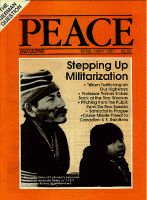
Peace Magazine Apr-May 1987, page 31. Some rights reserved.
Search for other articles by Ruth Pierson here
"The unleashed power of the atom has changed everything save man's modes of thinking, and thus we drift toward unparalleled catastrophe."
Albert Einstein, 1945
We all can play a part in the task of "changing our mode of thinking." As a historian, I can perhaps play a useful part by questioning a false analogy that is widely believed. Defenders of the nuclear arms race believe that military unpreparedness was to blame for World War II. But that analogy fails to connect that war with World War I. Historians of the future will regard the two world wars of this century as phases of the same war. Viewed thus, the Second World War will be seen as stemming not from lack of military preparation but from the injustices of the peace settlement of the first Great War, and from the virulent nationalism, racism, and militarism that fed on those injustices.
A more appropriate analogy with our situation today is the situation of the major European powers before the outbreak of World War I. The division of Europe into two hostile and competing alliance systems, both armed to the hilt, turned the continent into a tinderbox. As retired General Leonard Johnson has pointed out. not only did "military preparedness fail to prevent" the First World War, it "eventually made it inevitable."
The history of war is more commonly taught than the history of efforts to preserve peace. Military history and warfare have been glamorized. The activities of working toward a peaceful world sound less exciting than warfare. Military history appropriates such terms as "national defence" and "patriotism" and "heroism." A step toward new modes of thinking would be to question the use of such terms. The person willing to kill for her country is not the only patriot. Supporting the spiraling escalation of the arms race is not the only means of national defence. Indeed, those who work for disarmament may be the ones truly devoted to national defence.
Before the rise of Hitler, Germany had a peace movement. Contributors to that movement produced some of the most compelling novels and films of the period. One was Erich Maria Remarque's novel All Quiet on the Western Front, which an American company made into a film in 1930. The Nazis had long condemned the novel, which gave an unvarnished picture of the horrors of trench warfare during the First World War, as anti-German, and as undermining the German will to resist. The Nazis had not been able to block the novel's sales. But when the film was released in Berlin in December 1930, the Nazis drove audiences out of the theatres with stink bombs and with mice which they released! Those Nazi demonstrations, fully three years before Hitler's appointment as Chancellor of Germany, succeeded in getting the film withdrawn from circulation on the grounds that "it would tend to endanger Germany's national prestige."
There is alsoan erroneous assumption that the Second World War was fought by the anti-German allies in defence of Europe's Jews. Nothing could be further from the truth. According to the most recent historical investigations with which I am familiar, the mass murder of 5 to 6 million of Europe's Jews had been concluded months before the final defeat of Hitler's forces in May 1945. Not one military action had been taken specifically to obstruct the carrying out of the "Final Solution" despite the fact that, by 1943 at the very latest, the death camps were known. Instead, many of the few European Jews who were preserved from the Nazi death machine owe their preservation to non-Jews who were peace-minded and anti-militarist. One example is the village of Le Chambon in the mountains of France near the Swiss border. Here a Huguenot pastor and his wife and assistant pastor led their parishioners to turn their village into a refuge for Jews escaping from Nazis and the French police. They led Jews across the mountain trails to safety to Switzerland. Risking their own lives with every Jew they hid in their homes, these French villagers showed enormous courage. Such acts, based on nonviolence, saved the lives of more Jews than all of the guns of the guerrilla resistance movements and all the allied fare power put together.
To change our way of thinking, we can begin by considering the possibility that human life has been defended by acts of nonviolence as often as by acts of violence.
Dr. Ruth Pierson teaches in the Department of History and Philosophy of Education, Centre for Women's Studies, Ontario Institute for Studies in Education, Toronto. This article was offered as a public lecture.

Peace Magazine Apr-May 1987, page 31. Some rights reserved.
Search for other articles by Ruth Pierson here